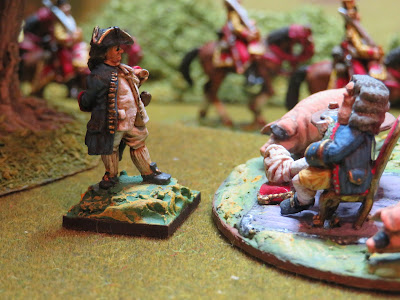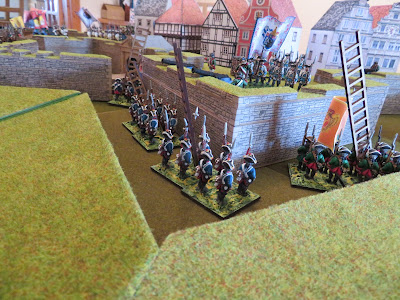'Sir, we have to go!' says a sergeant of Croats to Governor Schroedinger-Skatt. 'We must leave at once! The enemy have broken into the fortress!'
'The sergeant is right!' says Captain Andreas Dreihumpe, entering the room breathlessly. 'Despite my best efforts, the enemy has worsted us!'
'I didn't notice you in the fight', says the governor.
'I took up a supervisory role, sir. Facilitating. Scaffolding positive learning outcomes. That sort of thing. But now I might well be in trouble, what with me being parolled and not actually supposed to be in the vicinity of any fighting. I too must leave and flee expeditiously through the enemy lines!'
Schroedinger-Skatt sighs and takes one last look at the room. 'I've had some good times here. When the doors were locked. Well, we should indeed be away'.
(Below) 'Sir, sir!' Suddenly, Colonel Dougal Entendre and Major Gordon Sanitaire, the Scottish mercenary engineering officers of French extraction, also now rush into the room.
The governor nods approvingly. 'Ah gentlemen - I see that you are burdened with papers and packets - secret information, no doubt, that you wish spirited out of the fortress so that we can better continue the fight against the forces of the Spasmodic Sanction!'
(Below) The two Scots shake their heads. 'Nay sir - tis other purposes we have. Since the fortress is about tae fall, I thought it prudent tae make sure ye had our invoices and receipts. These are for engineering work rendered', says Entendre.
'And these, sir,' says Sanitaire, handing over an even larger quantity of papers, 'are for our expenses. The items on page three might seem to be surprising - but military necessity required the presence of every one of those actresses'.
'What?' says the governor, looking surprised and concerned. 'You're not coming with us? You aren't seeking to escape in order that we can continue the war?'
Entendre looks slightly furtive. 'Nay, my lord. In such desperate circumstances as those that we find ourselves in, the major and I have developed an alternative strategy'.
The governor looks surprised. 'You intend, like true professionals to die at your posts?'
'Och no, we're going to change sides'.
Schroedinger splutters. 'But - what about all that we have been through together? What about loyalty? Fidelity? Comradeship? Do they mean nothing? Have I had to put up with your suspiciously variable Scottish accents for nothing?''
'Aye sir', says the colonel. 'Noble qualities; but not, I have tae say, absolute requirements for mercenary engineers such as ourselves. We prize qualities from a rather different dictionary: one that contains rather more synonyms for such words as 'caution', and 'self-preservation'. Let's have no hard feelings, sir. And we did give you a bit of a discount. See here ...' he points to a line in a very long column of expenses. 'We only charged you half for the rulers'.
'But', says the governor, looking carefully at the figures, 'I don't remember you building a wooden horse'.
The colonel shrugs. 'Oh no, sir - we didnae actually bother - it never works. But if we had bothered, it would have cost you much more - so, charging you this amount for not building it actually has saved you quite a lot of money'.
'And, this ... haggis ... is it really so costly?'
'Aye - a luxury item, I'm afraid', says Entendre. 'But without haggis, no engineering work stands a serious chance of succeeding. Marshal Vauban himself was quite particular about it. It was his fourth rule of military engineering. Probably'.
'We really must go, my lord!' says Dreihumpe urgently.
'Very well', says the governor. He then looks up, his eyes glinting. 'But first, let us reward our faithful engineers!'
Soon, the party is fleeing from the front of the governor's residence (above). 'Entendre and Sanitaire didn't seem pleased', says Dreihumpe, puffing. 'I'll wager that it will take them some time to recover their expenses!'
The governor nods. 'Yes, well I had the sergeant stuff the paperwork quite far up their ... '
'Here we are, my lords!' interrupts the sergeant, pointing. Schroedinger looks.
'What? Where's my carriage? What's this?'
'A sedan chair', replies the sergeant (below).
'Yes, I can see that it's a sedan chair. But look at it. It's royally knackered. It doesn't fit together properly. Whoever constructed this sedan chair was blind, missing both hands, and really, really liked the colour brown. Get my carriage at once!'
'My lord, alas your carriage has no horses - they were eaten during the siege. There is nothing therefore to pull it. This sedan chair is the only remaining transport!'
The governor waves dismissively. 'Even without horses I think that my carriage would be faster than this! This escape will be rubbish. Look at those two men: there are dead badgers that look more energetic!'
'There's nothing else available, sir' says the Croat. 'We must hurry. Gelderland troops are pouring into the town. And even if we escape the town, sir, it is not clear that we will manage to pass through the enemy siege lines. They will never believe that we are civilians'.
'It might already be too late', says Dreihumpe. 'Rumour has it that the Gelderland troops are already looking for a govenor named Schroediner-Skatt and a certain Captain Dreihumpe'.
'There is still hope then', says the sergeant. 'Luckily, you, Governor, aren't Captain Dreihumpe; and you Captain Dreihumpe aren't Governor Schroedinger-Skatt'.
The captain looks askance at the sergeant. 'I don't think it work likes that', he says. 'We need a disguise', he adds.
'Quite', replies the governor. 'And I've had a thought - see over there? Sergeant, bring them to me!'
(Above) 'No - no XXXXXXX way!' says the sister. In case the governor misinterprets this as some form of assent, the nun adds a hand gesture to reinforce her point.
'Sister, if you but lend us your habits! Think of your country!' says the governor.
'We're xxxxxxx nuns! Swapping clothes must be morally wrong - it is certainly an activity of which the Devil would approve. He might even join in'.
Schroedinger dangles a key in front of her. 'If you're thirsty, I know where you can get your hands on plenty of strong perfume'.
'Just the habits', replies the sister quickly, taking off her belt, 'or all the way down to our scanties?'
'Just, er, just the habits ...'
'Just joking!', says the sister, whipping off her habit: 'we don't actually wear anything underneath'.
'Gargh!' croaks the governor.
Crammed into the sedan chair, Dreihumpe adjusts his wimple and looks back awkwardly at the governor's house.
'That's quite an impressive conflagration, sir', he says.
'Yes', says the governor. 'I set fire to all the important things that I didn't want to fall into enemy hands'.
Dreihumpe nods. 'Our plans, stratagems and intelligence?'
'Oh no - that's all here', says the governor, pulling a tiny folio from the folds of his habit. 'No, I set fire to my copies of
Plump Milkmaids, which I acquired obviously for the illuminating articles'.
The captain nods. 'Well, they certainly burn impressively'.
'Well, some of the woodcuts in them are rather incendiary'.
As the governor flees from Fort Pippin, the Gelderland troops begin sacking the town: except those that are set upon and beaten up by some surprisingly underdressed nuns.
Meanwhile, other events are occurring that, thank goodness, herald the final end to the war.
.JPG)

















































